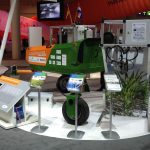 I’ve written previously about the tremendous growth in robot numbers, and indeed robot capabilities in the past few years, with both set to continue their incredible progress in the coming years.
I’ve written previously about the tremendous growth in robot numbers, and indeed robot capabilities in the past few years, with both set to continue their incredible progress in the coming years.
As you can perhaps imagine, many of these have been installed in vast facilities where owners feel able to invest the large sums required to gain the most use of mass automation.
A Dutch-German project, called SInBot aims to change that however by providing lower-cost robotics that is suitable for smaller-scale facilities.
Early results
The project is underpinned by an operating system that has produced promising early results. It was developed to help smaller manufacturers obtain some of the benefits of automation that have traditionally been the preserve of huge operators doing huge production runs.
The challenge is that reprogramming industrial robots for smaller production runs is often very expensive and time consuming. The process can also be quite hierarchical and therefore runs a significant risk of failure or error. This margin for error is more acceptable in larger runs than it is in smaller efforts, but it does tend to reduce the incentive for using robots in such niche projects.
Researchers from the University of Twente have studied ways to better control industrial robots, and their analysis suggests that the machines often have under-utilized capacity for doing so.
They believe that, with the right operating system, the robots are capable of quick and flexible performance. They can achieve this because they are not managed top down, but rather take a collaborative approach to their next task.
This heterarchical approach allows for a more effective and efficient distribution of tasks, which in turn makes it more cost-effective to run.
Flexible robotics
The researchers believe that systems such as this will rapidly become the norm in future as factories become more adaptive and flexible to short-term requirements. Such small-scale production will be almost completely automated as robots gain self-learning capabilities that herald the dawn of what they call ‘smart industry’.
SInBot is part of a wider cohort of projects operating under the SmartBot banner. The venture consists of some 24 partners from across Germany and the Netherlands that are building a hub for robotic sensing technologies.
There other projects include:
- AgroBot, which is designed to develop semi-autonomous robot systems to allow more eco-friendly farming
- RoboShip, which is designed to offer intelligent inspection on large ships
If you have an interest in industrial robotics, then it’s a project that’s well worth keeping an eye on.